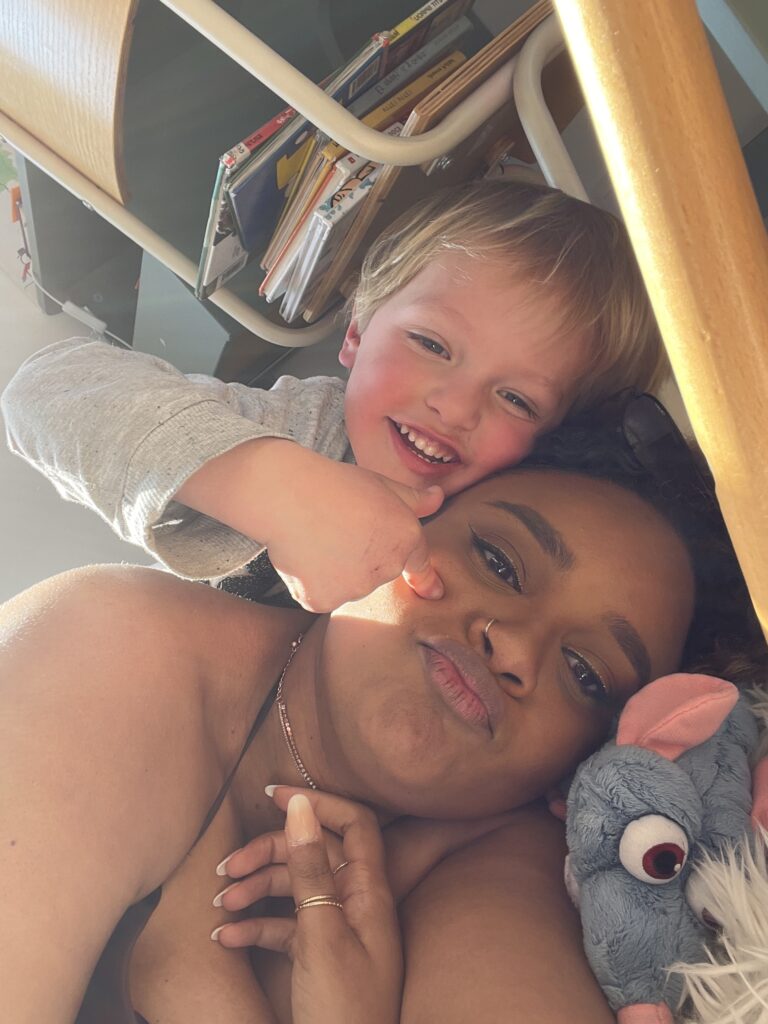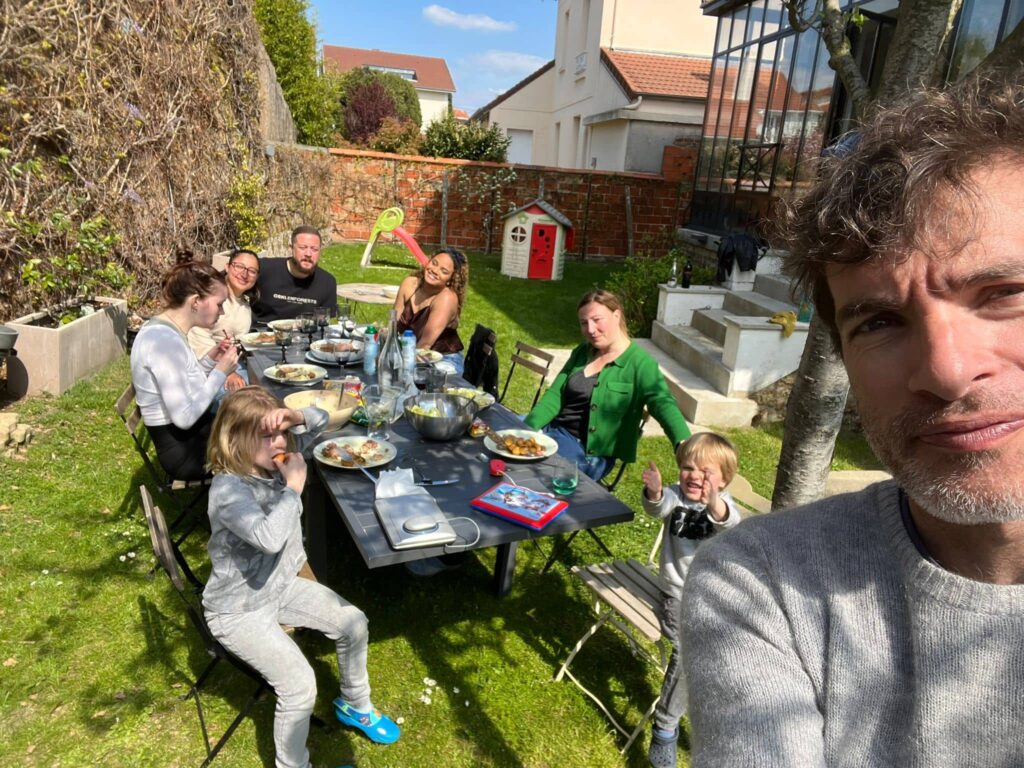If you’re planning to become an au pair in France, then you’re probably getting prepared to have your first video chat with your potential host family soon.

As a three-time former Au Pair in France, I’ve gained lotttts of insights of the do’s and don’ts when it comes to aupairing and finding a family. And one of the most important steps of the process is interviewing the families before you choose the best one for you.
Navigating your first Skype interview with a potential host family can be overwhelming, but asking the right questions is essential to ensuring a successful au pair experience.
Being on the same page about language spoken at home, main duties, and time off is crucial for a smooth transition into your new role as an au pair. The more honest and open the conversation is, the more likely the partnership will be successful for both parties involved!
In this post, I’ll go over the 9 must-ask questions you should be discussing with your potential host family before starting your au pair journey.
Key Takeaways
- Ask essential questions during the Skype interview to understand the host family’s expectations and ensure a successful au pair experience
- Discuss daily routines, language spoken at home, family activities, discipline style, dietary restrictions, and the frequency of babysitting
- Be clear about pocket money, additional expenses, and the house location to avoid miscommunications and to establish a healthy partnership with the host family
Prefer video? Check out my YouTube video on this topic here 👇
In this post, you'll find...
1. Why Do They Want an Au Pair?
One of the most important questions to ask your potential host family is why they want an au pair. This question allows families to express exactly what they’re looking for and what their expectations are.
It also helps to weed out the bad families who might just be looking for someone to take advantage of or want cheap labor from someone they know they won’t have to pay very much. (Which happens very often with au pairs, unfortunately, speaking from experience).
Some families don’t know the difference between a nanny and an au pair, so asking this question can bring light to what they’re expecting to get out of the arrangement.
- Are they looking for someone to take care of their kids for 40 hours a week, clean the house, and do the cooking?
- Or are they looking for someone to be part of the family, help out part-time, come and learn the language, learn the culture, and teach the family their culture?
I’ve found that asking this question really gives me a good idea of what they’re looking for and if it matches what I’m looking for in a family. It sets up the stage for an honest and transparent relationship between me and my host family, ensuring that both of our expectations are aligned from the start.
2. What’s My Daily Routine and Time Off?
In my first Skype interview with my host family, one crucial question I asked was about my daily routine and what my tasks would look like.
It was important to know if I would be taking the kids to school, picking them up, giving them showers, cooking their dinner, or helping with homework. This allowed me to understand better what’s expected of me, and how I can fit into the family’s daily life.
Time off is another aspect to discuss. It’s essential to know if I work weekends, have weekends off or am granted vacation time. Knowing when the vacation time will happen is also helpful, as most families usually plan their vacations in advance.
In my experience, my host family provided me with all my vacation days for the entire year before I arrived, which allowed me to plan my vacation days ahead of time accordingly.
Being aware of time off and vacation days is vital since it allows you to understand how much time you’ll have for personal activities, and when you’ll be expected to be available for the host family. It also helps to maintain a healthy work-life balance while living and working with your host family – which definitely came in handy during the pandemic!
3. What Language is Spoken at Home?
In my experience as an au pair, it is crucial to ask potential host families what language they speak at home. While you might assume you’ll be teaching the children your language and learning theirs, this is not always the case.
Believe it or not, I have actually had friends who became au pairs in France specifically to learn French – only to find their host family spoke only English at home and didn’t help them progress in the language.
This resulted in limited opportunities for them to practice the local language and hindered their progress. This obviously could have been avoided if they had discussed this aspect with the host family during the interview.
Although it may seem obvious, it is important to double-check with your potential host family and ensure you both share the same expectations. If learning the local language is high on your priority list (which it should be if you’re moving to a new country), you must not hesitate to verify the linguistic environment in the host family’s home.
P.S. Check out my guide on How I Learned French in A Year & My Best Tips for Learning!
4. What Activities Do They Like to Do As A Family?
When I was looking for a potential host family, my favorite question to ask was what their hobbies were to get a better understanding what a family likes to do together. This question helps you get a sense of their personalities, interests, and how they spend their time.
When asking, you might learn if the family enjoys engaging in activities on weekends, or if they prefer to stay home and relax.
There are families who work a lot, and during their free time, the parents may prefer doing their thing while the kids play on their own. Knowing these details beforehand can give you an idea of how involved you’ll be during family time and the expectations they will have for you.
I wish I would’ve asked this question before starting with my second host family, because I probably wouldn’t have decided to work for them. They pretty much had no outside hobbies outside of work and never spent much time with their kid, so I was the main person expected to play with her at all times, even when both parents were home.
5. What is Their Discipline Style?
One crucial aspect to consider when becoming an au pair is understanding the family’s discipline style. The way a family disciplines their child will have a significant impact on my experience with the child.
For example, if a family disciplines their children by taking away privileges like using the iPad or watching TV, I can adopt that discipline style when working with the kids.
This question can seem awkward, but it’s essential because it helps establish if the family disciplines their children and how strict or lenient they are.
These factors will undoubtedly affect my time with the family, especially if children don’t see their parents as authority figures. And in this case, they probably won’t see me as one either. It’s essential to establish authority, so children know that when I’m working, I am in charge and when their parents are home, the parents are in charge.
Having a discussion about discipline styles ensures both the au pair and the family are on the same page. It is crucial to clarify this, so I put myself in a position to be respected by the children.
If children realize I have a different discipline style than their parents, it can create a power imbalance, making them less likely to see me as an authority figure and follow my rules.
Although it can be uncomfortable asking about discipline styles, being open and honest will always work in your favor. So don’t be afraid to ask the hard questions so that you can have a positive experience and manage children effectively while working as an au pair.
6. Do They Have Any Dietary Restrictions?
While being an au pair, it’s essential to know and discuss dietary restrictions with your host family ahead of time. It’s essential for both parties to be aware of any specific allergies or food preferences.
As an au pair, I may have dietary restrictions, or I might not like the same foods as my host family. Communication is key to making sure everyone is comfortable in this shared living situation.
Dinner is usually a meal where all family members, including the au pair, eat together. Discussing the dietary preferences and restrictions beforehand allows for a more enjoyable dining experience for everyone. If asked, host families should be willing to accommodate special diets, but having it discussed as early as possible helps prevent any misunderstandings in the long run.
Also, let them know about any allergies or specific foods that you cannot eat.
It can be very helpful to talk about the types of meals that the family typically enjoys and to share your own preferences as well, in a respectful and open manner. This helps both you and your host family to understand what daily meals may look like and further enhances your cultural experience by engaging in their meal traditions.
In addition to considering allergies and dietary preferences, it’s essential to discuss the possibility of accommodation by the host family for those with severe dietary restrictions. Establishing clear expectations about meals and dietary needs before you move in together can help to avoid any meal-related issues down the line.
7. Will I Have to Do Any Babysitting or Extra Hours?
A crucial question to ask your potential host family during the first Skype interview is how often you will be required to babysit.

Of course, there’s going to be times when they ask you to babysit last minute or something comes up, and you can’t always plan for every event that will happen. However, it is essential to have this conversation ahead of time to avoid misunderstandings and ensure both parties understand the expectations.
Generally, au pair families ask for one to two nights per week of babysitting, which is usually the standard. But of course, it can be more or less, depending on the specific family and their needs. Having this conversation ahead of time gives you an idea of how often you’ll be babysitting and allows you to manage your expectations, as well as your free time during your au pair experience.
When discussing babysitting frequency, make sure to clarify how much notice you can expect for babysitting assignments, as this can help you plan your personal time more effectively. You’ll also want to communicate any concerns you might have about babysitting responsibilities to ensure both parties have a smooth and enjoyable experience during your time as an au pair.
8. What is the Monthly Pocket Money Offered?
When it comes to pocket money and expenses, it’s important for both au pairs and host families to discuss details beforehand. I’ve found that having open conversations about money can sometimes be awkward or intimidating, but it’s crucial to have these talks before you start the au pair experience.
Of course, being an au pair isn’t something you do for the money; it’s more about the experience. But you still need some pocket money while you’re there.
During your interview, establish how much you’ll be paid, what days you’ll be paid on, and what’s included in your salary. Most au pairs receive pocket money every week or every month, with additional benefits such as transportation passes, phone bills, and health insurance.
In my experience, host families should also cover any expenses while you’re out with the kids – for instance, if they want something, there should be a set-aside amount of money to purchase items for the kids without using your pocket money.
There are specific guidelines and minimum amounts that au pairs should be paid each month depending on which country you are going to. Check out the AupairWorld Blog for up-to-date info on pocket money requirements by country.
9. Where is the House Location?
One crucial question to ask when interviewing with a potential host family is about the house location. It’s important to determine the proximity of the house to the city center, especially if you’re considering a position in a place like Paris.
Some au pair families may live in the suburbs rather than the center of the city, and they might not always disclose that information on their profiles.
Understanding the house location will help you manage your expectations and better plan your time in the new country. It can also affect your experience with transportation and activities during your time off.
When I was an au pair in France, I lived with a family in the suburbs of Paris, about 45 minutes from the city center. It wasn’t too far and there were trains that ran frequently to get to the city, but they stopped early at night and weren’t as consistent as the transport in the city center.
Because of this, I sometimes had to pay to get an Uber home after a night out, which cut into my weekly allowance.

Asking about the house location can help you gain a better understanding of the family’s lifestyle, giving you valuable insight into whether or not the position is a good fit for you.
When discussing the house location, it might be useful to ask about nearby public transportation options and what kind of transportation pass the family might provide. It’s also a good idea to discuss any additional support for transportation costs, such as a phone bill, and the distance to language schools or other places where you might want to spend your free time.
Not only will understanding the house location help you make a more informed decision about accepting a position with a specific family, but it will also demonstrate your interest and dedication to making the most of your time as an au pair.
By asking the right questions, you can ensure a smoother transition to your host family’s home and create a more enjoyable experience for both parties.
Thanks for reading!

I hope this pot was helpful in learning what questions to ask in your interview and what to look for in a potential host family!
